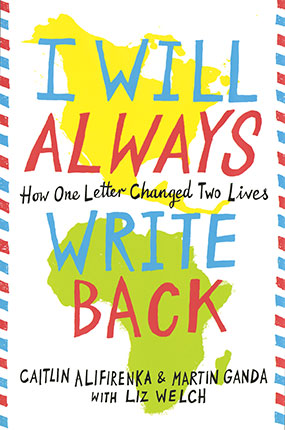Full Text Reviews: School Library Journal - 02/01/2015 Gr 6 Up—The true story of two young pen pals who forge a life-altering connection. In 1997, Caitlin, a typical 12-year-old girl from a middle class American family, began writing to Martin, a studious 14-year-old from a Zimbabwe slum. In her letters, Caitlin described her life, which consisted of shopping trips, quarrels with friends, and problems at school. Martin was initially far more circumspect in his responses. Inflation had rocketed in Zimbabwe, and even finding money for postage was a struggle for the boy. Staying in school, which required paying costly fees, became merely a dream. Eventually, Martin revealed the harsh realities of his life to Caitlin, who began sending money and gifts. What started as chatty letters turned into a lifeline for Martin and his family, as Caitlin and her parents helped the boy stay in school and achieve his goal of studying at an American university. This is a well-written, accessible story that will open Western adolescents' eyes to life in developing countries. Told in the first person, with chapters alternating between Caitlin's and Martin's points of view, this title effectively conveys both of these young people's perspectives. Caitlin's early chapters, however, in which she discusses friendship and boyfriend woes, feel somewhat superficial compared with Martin's genuinely troubled life. While these chapters provide an effective contrast between the two teens' lives, they may discourage some readers from continuing with what becomes a strong and inspiring story. VERDICT A useful addition to most collections and an eye-opening look at life in another culture.—Michelle Anderson, Tauranga City Libraries, New Zealand - Copyright 2015 Publishers Weekly, Library Journal and/or School Library Journal used with permission. Bulletin for the Center... - 07/01/2015 A “typical twelve-year-old American girl,” Caitlin Stoicsitz began her correspondence with fourteen-year-old Martin Ganda as a result of a school assignment. Her letters were full of middle-school melodrama, while gifted student Martin was determined to find his way out of the slums of Zimbabwe by pursuing his education. Though Caitlin initially knew very little of Martin’s abject poverty, she eventually began sending him money and soon enlisted the help of her mother in finding ways to fund his school tuition and to send care packages of clothes and shoes. The Stoicsitzes’ generosity did not stop there: upon learning of Martin’s ambitions to attend university in the States, Caitlin’s mother worked tirelessly to find him a full scholarship to Villanova, and the book closes with pictures of Martin and Wallace, another boy from his school whom the Stoicsitz family took under their wing, at Caitlin’s wedding, as well as an epilogue where Martin describes his career success. While this is certainly an inspirational story with which to open a unit on cross-cultural communication, Caitlin’s claims to be “typical” are somewhat strained given her multiple international vacations with her family, and there’s a strong sentimental overlay to the account. However, Martin’s story is eye-opening to say the least, and the suspense generated by Caitlin’s mother’s repeated and often frustrated attempts to secure funding reads like well-wrought fiction. Martin seems so earnest and well intentioned that it is impossible not to root for his success; readers may be encouraged to find their own Martin to support. KC - Copyright 2015 The Board of Trustees of the University of Illinois. Loading...
|



